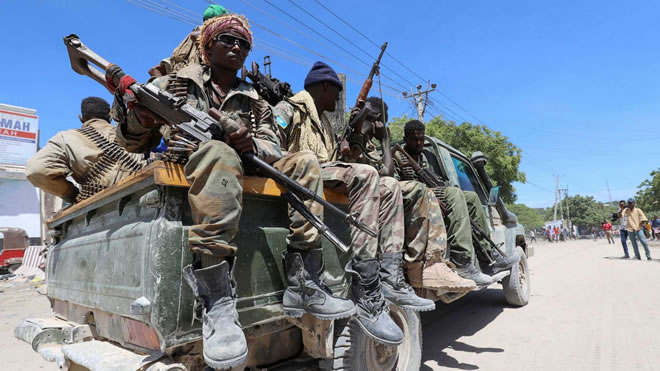
Saturday April 8, 2023
By Mohamed Olad Hassan

FILE - Hassan Sheikh Mohamud, the president of Somalia, leads a demonstration at Banadir Stadium, Mogadishu, Jan. 12, 2023. The president announced Friday that his government has banned people from carrying weapons on the streets of Mogadishu, the country's capital.
Somali President Hassan Sheikh Mohamud announced Friday that his government has banned people from carrying weapons on the streets of Mogadishu, the country's capital.
"We impose a strict ban on carrying guns in the streets of Mogadishu. One cannot justify having machine guns mounted on vehicles and rocket propelled grenades in the streets, for protection from a hiding al-Shabab militant armed with a pistol," the president said.
The president announced the ban during a Friday prayers sermon held inside his presidential compound in Mogadishu.
advertisements
He said flouting the ban would not be tolerated."We will fight against those who fail to abide by the measures," he warned.
Mohamud has also banned traders from importing all kinds of military gear, from uniforms to boots to equipment.
"No businessman can bring any kind of military gear into the country, let alone weapons. The traders cannot even import Abdi Bile vehicles in the country," the president said.
Abdi Bile is a local name for a Toyota pickup model named after a Somali American runner who won the 1987 World Championship 1,500-meter in Rome, and it is popular in Somalia for being the best to mount self-propelled anti-aircraft guns.
An effort to restore stability
Some security experts see the move as a big step in the process of restoring stability in Mogadishu, which has not had reliable security plans since the collapse of the Siad Barre military regime in 1991.
"Since the collapse of the military regime, there has not been a single reliable and effective security plan that helped the city's stability. Now, banning weapons from the streets is a good sign forward," said General Mohamed Farah Aliyow, a veteran Somali military general, and Toronto-based security analyst.
Mogadishu, a densely populated seaside capital, was known as the White Pearl of the Indian Ocean before the civil war.
Over the years, the business community has set up its own security teams to protect their lives and properties. Government officials and lawmakers also have their own heavily armed guards, and armed private security guards operate in the city, making the city awash with guns.
Guns and other small arms are still available for sale in some areas of the city, though not as openly as they were in the past.
Government goes after al-Shabab
Hours before the announcement of the weapons ban, government media declared that the second phase of the government's war with al-Shabab militants has begun in the Central Somalia region of Hiran.
Last week, government officials said they ended an eight-month-long military operation against al-Shabab militants.
During military operations early Friday, the Somali National Army, backed by local clan militias, took control of several villages in the Hiran region from the militants.
"The liberated areas have been hideouts of al-Shabab militants, but not strong bases, we will pursue them to their strongholds in the West of Beledweyne town," said Hiran regional governor Ali Jeyte Osman. "I told before and repeat again: al-Shabab fighters are cowards who can't face the army and the locals."
Osman said the army took over the villages of Berhano, Tarejento, Burdaar and Nuur-Fanah, located south of Beledweyne, which has been the center of local communities' mobilizations against al-Shabab. Beledweyne is about 300 kilometers north of Mogadishu.
On March 25, Somalia's Ministry of Information said that 3,000 al-Shabab militants had been killed and 3,700 more injured in the first phase of military operations from August 2022 through January 2023. The government also said 70 towns and villages had been liberated from al-Shabab.
Meanwhile, the militant group claimed that the first phase of military operations by the Somali government and local fighters had failed. There have never been independent sources confirming the claims of either side, especially the number of war casualties.
In an interview with VOA's Somali Service this March, Hussein Sheikh Ali, the national security adviser for the Somali president, said the three neighboring countries — Djibouti, Ethiopia and Kenya — were to send new troops to support Somali forces against al-Shabab in the second phase of the military operations, but it is not known when these troops will arrive.
Abdiaziz Ahmed contributed to this report from Mogadishu.